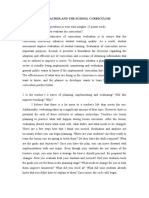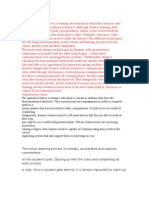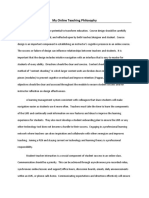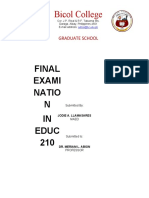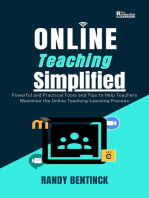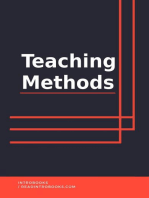Module 2 Reflection Venn
Module 2 Reflection Venn
Uploaded by
Patricia MacIntyreCopyright:
Available Formats
Module 2 Reflection Venn
Module 2 Reflection Venn
Uploaded by
Patricia MacIntyreOriginal Description:
Copyright
Available Formats
Share this document
Did you find this document useful?
Is this content inappropriate?
Copyright:
Available Formats
Module 2 Reflection Venn
Module 2 Reflection Venn
Uploaded by
Patricia MacIntyreCopyright:
Available Formats
Reflection: The Humble Observations of an Online Principal
The Venn diagram above illustrates some of the key distinctions between blended online instruction and classroom-based (face-to-face) instruction. The information and descriptions in Module 2 aligned with my personal experience, having been a classroom-based teacher for over 20 years, a technology program manager for 9 years, and the principal of an online high school for the past four years. In case you are wondering what SPKCT means in the Venn diagram, that is my acronym for having a Skilled, Passionate, Knowledgeable and Caring Teacher...which is still the most important factor to ensure successful student learning. Working through this module was very validating, as many of the skills and strategies associated with quality online learning are practices we have been striving to implement and/or strengthen at iHigh. A key instructional methodology we emphasize is ongoing student-teacher interactions. While it is possible for students to be somewhat invisible in a traditional classroom, iHigh teachers are continuously contacting their online students via the online message center to answer questions, check for understanding, provide feedback on assignments and assessments, link students to supplemental online resources, and monitor overall student progress. iHigh teachers learn to be masters at triaging their email, meaning they continuously scan their Inboxes so they can quickly respond to high-priority student/parent questions and requests before moving on to tasks such as grading assignments and tests. Teachers strive for 24-hour response times for email inquiries, 1-2 days for grading regular assignments, and 3-4 days for grading major exams and/or projects. Individualized learning can be a challenge because the online coursework (vendor developed) is structured into specific assignments that integrate with the online gradebook. iHigh teachers have experience in identifying individual student needs and finding creative ways to support different learning styles and abilities. Within their departments, teachers have compiled a gallery of online resources (documents, video links, web resources, etc.) that can quickly be attached to an email, to help illustrate or reinforce a range of concepts and skills related to the online courses. This strategy helps keep students motivated, along with ongoing teacher encouragement and supportive communications. iHighs blended model allows students to come to campus for individual or small group tutoring, as needed. The teachers ongoing progress monitoring and effective interventions also help iHigh students build time management skills in learning to stay on track with the course pacing guides. While many of these strategies and skills have a counterpart for teachers in a classroom setting, the unique demands of effective online instruction require teachers to develop effective skills for diagnosing, motivating, instructing, and assessing online learners. Veteran iHigh teacher Jason Bailow, who is one of the original teachers from our 2008 pilot program, provided an excellent summary of the skills and strategies that our staff works daily to improve and expand upon, to best support student learning. Jasons characteristics of a successful online teacher include: Organizes and prepares course materials (rigorous and relevant content and supplemental materials/resources) Is highly motivated and enthusiastic (encourages, inspires and motivates students over the web) Is committed to teaching (dedicated professional who genuinely cares about kids) Has a philosophy supporting student-centered learning (goes the extra mile to individually assist, support and encourage every learner)
Is open to suggestions following pre- and post-learning evaluations (accepts constructive feedback from students, colleagues, supervisors) Demonstrates creativity (to help maintain student interest and motivation) Takes risks (tries new ideas; incorporates new technologies and projects to supplement vendor-developed courses) Manages time well (effectively prioritizes student/parent communications; promptly grades assignments and provides meaningful feedback; maintains ongoing interactions with students and monitoring of their progress; activates learning interventions when needed) Is interested in online delivery of courses with no real rewards (embraces the learning curve, challenges, adventures and trade-offs in becoming an effective online teacher) Responds to learners needs within the expectations (maintains high expectations while individualizing as much as possible to meet student needs).
The parenthesized comments are my reflections on Jasons summary of key skills and strategies for successful online learning.
You might also like
- Certificate of Participation SuperstarsDocument29 pagesCertificate of Participation SuperstarsGrace B. RevitaNo ratings yet
- Tenet 4 ReflectionDocument8 pagesTenet 4 Reflectionapi-456203716No ratings yet
- 302 Paper MaeDocument26 pages302 Paper MaePhantom ThiefNo ratings yet
- Mentorship at A Glance - ICT in EdDocument4 pagesMentorship at A Glance - ICT in EdTeachers Without BordersNo ratings yet
- 06t02 Standards Online Teaching PDFDocument12 pages06t02 Standards Online Teaching PDFJean Pierre GuittardNo ratings yet
- Pgae 105Document7 pagesPgae 105carminaobsequio28No ratings yet
- Compre ReviewerDocument44 pagesCompre ReviewerAshley RañesesNo ratings yet
- Distance Learning Essentials 1Document25 pagesDistance Learning Essentials 1api-668405692No ratings yet
- An Opportunity Culture For Teaching & Learning at Project L.I.F.T. SchoolsDocument4 pagesAn Opportunity Culture For Teaching & Learning at Project L.I.F.T. SchoolsvinamraNo ratings yet
- FtrainingmanuelDocument14 pagesFtrainingmanuelapi-266517510No ratings yet
- Portfolio-Professional Statement and GoalsDocument10 pagesPortfolio-Professional Statement and Goalsapi-235551194No ratings yet
- Significance of Professional Development With UrduDocument6 pagesSignificance of Professional Development With UrduTariq Ghayyur100% (1)
- Jasmyne Burns Resume Final 1 204weeblyDocument2 pagesJasmyne Burns Resume Final 1 204weeblyapi-324377651No ratings yet
- JD-Program AssociateDocument3 pagesJD-Program AssociateSubNo ratings yet
- How To Make The School Curriculum A SuccessDocument3 pagesHow To Make The School Curriculum A SuccessStore Bangfey1No ratings yet
- Professional Learning CapstoneDocument4 pagesProfessional Learning Capstoneshivani kumariNo ratings yet
- Guidelines For Observation of Online TeachingDocument16 pagesGuidelines For Observation of Online TeachingIriskathleen AbayNo ratings yet
- I. Catalog Course Description and Credit Hours of CourseDocument9 pagesI. Catalog Course Description and Credit Hours of Courseapi-140191607No ratings yet
- Instructional PlanningDocument6 pagesInstructional PlanningMarienel Ilagan100% (1)
- Blog Template t6-12Document8 pagesBlog Template t6-12api-291958931No ratings yet
- ACCOMPLISHMENT2023Document23 pagesACCOMPLISHMENT2023Camelle MedinaNo ratings yet
- KSC For PortflioDocument5 pagesKSC For Portflioapi-239660613No ratings yet
- Anotche Clarise B. The Teacher and The School Curriculum Final ExamDocument5 pagesAnotche Clarise B. The Teacher and The School Curriculum Final ExamJemma Rose TegioNo ratings yet
- What Is Blended Learning?: What Does It Look Like in Grades Kindergarten-2 ?Document8 pagesWhat Is Blended Learning?: What Does It Look Like in Grades Kindergarten-2 ?ulker gurbanovaNo ratings yet
- Blended Learning - WhitePaper - OverviewImplementation - 4keysDocument7 pagesBlended Learning - WhitePaper - OverviewImplementation - 4keysPeregély AnnaNo ratings yet
- Elementys of ProfessionDocument11 pagesElementys of ProfessionfrederickNo ratings yet
- How To Become A Stem or Steam TeacherDocument13 pagesHow To Become A Stem or Steam TeacherMarvin BadiolaNo ratings yet
- E Tutor Online JobsDocument6 pagesE Tutor Online Jobsvijay RajputNo ratings yet
- E Tutor Online JobsDocument6 pagesE Tutor Online JobsRG RAJNo ratings yet
- Course Code 8626 No-2Document12 pagesCourse Code 8626 No-2Shakeel BalochNo ratings yet
- Description of Duties, Responsibilities and Curricular LinkagesDocument8 pagesDescription of Duties, Responsibilities and Curricular LinkagesDalton McleanNo ratings yet
- Developing E-Learning Materials For Software Development CourseDocument7 pagesDeveloping E-Learning Materials For Software Development CourseijmitNo ratings yet
- Edison 03 Sum EducDocument33 pagesEdison 03 Sum EducYork Daily Record/Sunday NewsNo ratings yet
- ConclusionDocument7 pagesConclusionEng Jye NgNo ratings yet
- Reflection 3 and 4Document2 pagesReflection 3 and 4Rhona MaravillaNo ratings yet
- Online Teaching PhilosophyDocument4 pagesOnline Teaching Philosophyapi-99570533No ratings yet
- Untitled Document - EditedDocument11 pagesUntitled Document - EditedJoshua O'NealNo ratings yet
- Mentorship ICT at A GlanceDocument5 pagesMentorship ICT at A GlanceTeachers Without Borders0% (1)
- A Case For Blended LearningDocument14 pagesA Case For Blended LearningDPSG DEHRADUNNo ratings yet
- How Teachers LearnDocument4 pagesHow Teachers LearnMosharraf Hossain SylarNo ratings yet
- Philosophy of Assessment Macbook Pros Conflicted Copy 2015-05-03Document4 pagesPhilosophy of Assessment Macbook Pros Conflicted Copy 2015-05-03api-272624393No ratings yet
- Guide For Ratees Sy 2022 2023 2Document6 pagesGuide For Ratees Sy 2022 2023 2VANISSA CENIZANo ratings yet
- E-Tutor Online JobsDocument7 pagesE-Tutor Online JobsUday SolNo ratings yet
- Instructional Technology Specialist Rubrics 6.01.14Document22 pagesInstructional Technology Specialist Rubrics 6.01.14Innovative Educational Services, CCIUNo ratings yet
- End of The Year Evaluation KZDocument6 pagesEnd of The Year Evaluation KZapi-272099860No ratings yet
- Final Examination Curriculum and EvalDocument4 pagesFinal Examination Curriculum and EvalJODIE LLAMASARESNo ratings yet
- Sprayberry High School Strategic PlanDocument2 pagesSprayberry High School Strategic PlanjenniferkadienNo ratings yet
- Report in Teaching EnglishDocument3 pagesReport in Teaching EnglishJaemilyn O. ValenciaNo ratings yet
- Teaching Class Employee Performance and Development PlanDocument19 pagesTeaching Class Employee Performance and Development Planapi-298158473No ratings yet
- PRT End of Year Report - Katie EverettDocument3 pagesPRT End of Year Report - Katie Everettapi-294861001100% (1)
- LDM 2Document15 pagesLDM 2Ha-NepTune-In 125No ratings yet
- MaquemaDocument2 pagesMaquemaRhea CagauanNo ratings yet
- Pro Teaching Form 2015-2016 Revised August 10 2015Document3 pagesPro Teaching Form 2015-2016 Revised August 10 2015api-254850587No ratings yet
- 7 Effective Teaching Strategies For The ClassroomDocument10 pages7 Effective Teaching Strategies For The ClassroomMarina Obenia PascualNo ratings yet
- Capstone PartaDocument12 pagesCapstone Partaapi-237767516No ratings yet
- Teaching Methodology in Elementary EducationDocument4 pagesTeaching Methodology in Elementary EducationRochelle AnneNo ratings yet
- Blended LearningDocument3 pagesBlended LearningitsjewdyeNo ratings yet
- Is It Working in Your Middle School?: A Personalized System to Monitor Progress of InitiativesFrom EverandIs It Working in Your Middle School?: A Personalized System to Monitor Progress of InitiativesNo ratings yet
- Integrating Teaching and Learning: “Timeless Essentials” for Creating Integrated Units of Study, Volume 2From EverandIntegrating Teaching and Learning: “Timeless Essentials” for Creating Integrated Units of Study, Volume 2No ratings yet
- Instruction CommentaryDocument6 pagesInstruction Commentaryapi-395831257No ratings yet
- 2013 WASSCE Ranking Exposeghana PDFDocument15 pages2013 WASSCE Ranking Exposeghana PDFKwasi Otchere Danquah50% (2)
- Letter To Potential Advisory Committee Member SampleDocument1 pageLetter To Potential Advisory Committee Member SampleTeri WILSONNo ratings yet
- Accreditation of Initial Teacher Education Programs in AustraliaDocument36 pagesAccreditation of Initial Teacher Education Programs in Australiaeddie zhouNo ratings yet
- FTC ApplicationDocument5 pagesFTC ApplicationJacobNo ratings yet
- Umu Newsletter 19-1Document22 pagesUmu Newsletter 19-1Alex A. AgabaNo ratings yet
- Writing The Personal StatementDocument3 pagesWriting The Personal Statementclarissasvezna100% (1)
- How To Write A Research ProposalDocument3 pagesHow To Write A Research ProposalMaria AvgeriNo ratings yet
- Gen - Ranjeet Dilshan - 20201016 - 000356Document1 pageGen - Ranjeet Dilshan - 20201016 - 000356Shaashwat SinghNo ratings yet
- Dan Davies Letter To Min. Rob Fleming (Classroom Sinks & PPE)Document2 pagesDan Davies Letter To Min. Rob Fleming (Classroom Sinks & PPE)AlaskaHighwayNewsNo ratings yet
- Changes in The Curriculum Adaptation Skills of Teachers A 2024 Teaching andDocument13 pagesChanges in The Curriculum Adaptation Skills of Teachers A 2024 Teaching andalbertus tuhu100% (1)
- Teacher Personality and Students LearninDocument7 pagesTeacher Personality and Students Learnininna jcNo ratings yet
- Collaborative Action Research To Implement Social-Emotional LearnDocument23 pagesCollaborative Action Research To Implement Social-Emotional LearnAirene GraceNo ratings yet
- GenaposohfDocument152 pagesGenaposohfanon_38056826No ratings yet
- Concept: Child and Adolescent Development/Facilitating LearningDocument360 pagesConcept: Child and Adolescent Development/Facilitating LearningJeffrey Roy Adlawan LopezNo ratings yet
- Using Physical and Virtual ManipulativesDocument46 pagesUsing Physical and Virtual ManipulativesKhalid MeqdadNo ratings yet
- Three Saints Named ACHA Academic All-AmericansDocument2 pagesThree Saints Named ACHA Academic All-Americansapi-184666178No ratings yet
- Usaid Schools ProjectDocument25 pagesUsaid Schools ProjectDennis ItumbiNo ratings yet
- B.Ed. (Hons.) 4-Year Degree Program (Elementary) : Bachelor of Education (Hons.)Document6 pagesB.Ed. (Hons.) 4-Year Degree Program (Elementary) : Bachelor of Education (Hons.)sadia kalsoomNo ratings yet
- English 10b SyllabusDocument7 pagesEnglish 10b Syllabusapi-166625307No ratings yet
- CMJR Scholarship ApplicationDocument6 pagesCMJR Scholarship ApplicationCaro VeraNo ratings yet
- How Popular Musicians LearnDocument20 pagesHow Popular Musicians LearnJoaquim PereiraNo ratings yet
- CAT MBA E Book PDFDocument29 pagesCAT MBA E Book PDFHan XiaoNo ratings yet
- Plan de Lectie Clasa A 8-A - 24 Nov. 2014Document2 pagesPlan de Lectie Clasa A 8-A - 24 Nov. 2014Marinică ȘchiopuNo ratings yet
- AchievementsDocument4 pagesAchievementsapi-532080614No ratings yet
- Feb07.2015 Bupgrade of The Quality of Teacher-Education, A NecessityDocument2 pagesFeb07.2015 Bupgrade of The Quality of Teacher-Education, A Necessitypribhor2No ratings yet
- School Resource Management SystemDocument1 pageSchool Resource Management SystemMeredith Francesca PeraltaNo ratings yet
- Boy by Roald Dahl Reading GuideDocument25 pagesBoy by Roald Dahl Reading GuideES MP3No ratings yet
- Clemen Tablante Form SF5Document16 pagesClemen Tablante Form SF5MelanioNo ratings yet






















